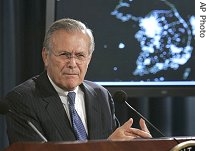2006年VOA标准英语-Rumsfeld: Proliferation Main Concern with North(在线收听)
By Al Pessin
Pentagon
11 October 2006
U.S. Defense Secretary Donald Rumsfeld says his main concern following North Korea's claim that it tested a nuclear explosive is that it could provide nuclear technology to other countries, and to terrorist groups.
-----
 With a map of Korean Peninsula behind him, Donald Rumsfeld gestures during press briefing at Pentagon, Oct. 11, 2006 |
||
"Their programs point to increasing risks of lethal weapons possibly ending up in the hands of non-state entities, folks that, unlike a nation, tend not to be deterred the way a nation-state would because they don't have to worry about protecting real estate, population and leadership," he said.
Secretary Rumsfeld says North Korea and Iran have already shown their willingness to sell weapons both to other countries and to terrorist groups. He also expressed concern that North Korea's test could inspire moves by other countries in Asia to develop their own nuclear weapons capabilities.
The secretary did not discuss any possible military responses to North Korea's apparent new capability, nor did he confirm whether the explosion on Monday was nuclear or not. But he said this is an issue that no one country can deal with, and that the international community needs to come together on a joint response.
"It will take a relatively common threat assessment, assessment of the world's circumstance, on the part of other countries," Rumsfeld said. "It will take a willingness on the part of other countries to forego commercial opportunities in exchange for security interests. And it will require all the international community of free nations to decide that action during this period, when the threat is not immediate, is the time to do it, rather than when the threat becomes more immediate, in whatever number of years that may be."
Secretary Rumsfeld says he believes it is possible for diplomacy to work with North Korea, without the direct threat of the use of force. But he says 'time will tell' whether sanctions will be effective, and whether the international community will be willing to do what is necessary to convince North Korea's leaders to give up their nuclear weapons program.